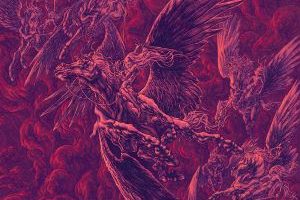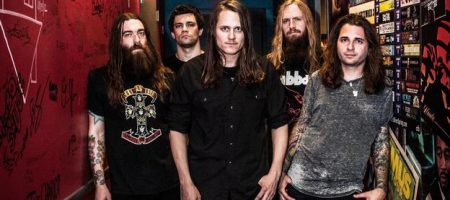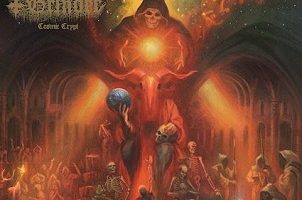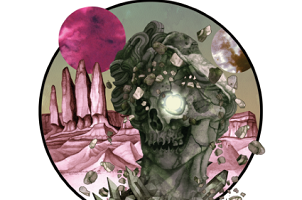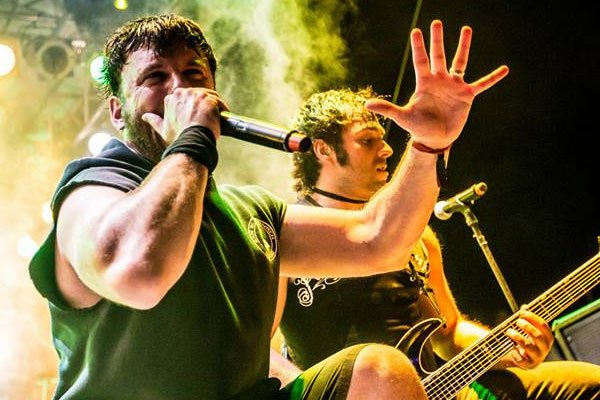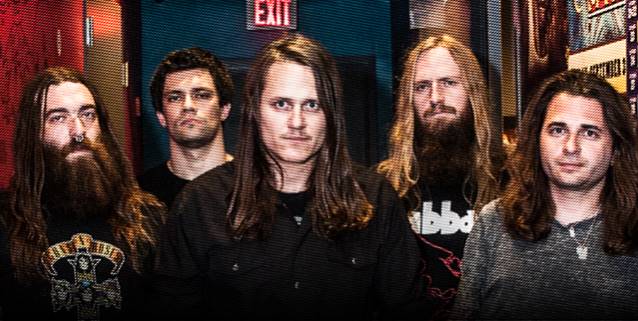Darkest Hour – A Wealth of Experience
Sunday, 11th February 2024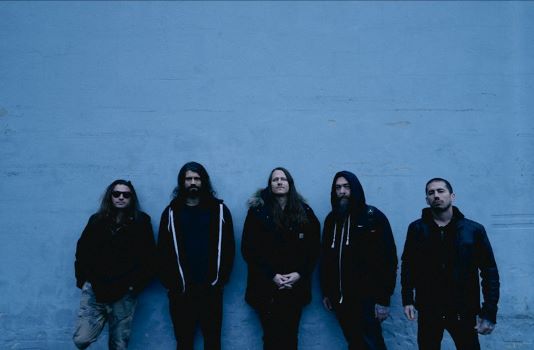
One of the first American acts that started to really showcase some influence from the Gothenburg scene in this scribe’s memory is that of Darkest Hour. Injecting Scandinavian melodies into a more visceral, American sound the way that they did seemed fresh and innovative. The band has been going strong ever since, with their upcoming Perpetual | Terminal being the band’s tenth full-length album in a career spanning close to 30 years at this point. A perfect time to talk with guitarist Mike Schleibaum about not just the band’s latest release, but look back over time to their beginnings, what they have learned as a group, and even more.
Dead Rhetoric: Outside of COVID slowdowns, what has the band been up to in the years between albums?
Mike Schleibaum: First we went on tour heavily after Godless Prophets came out. In fact, we were on tour right up to when we were in Italy right after Exodus and Death Angel both got COVID. We were touring during that period as hard as I have ever toured in my entire life. With Machine Head we were everywhere, then with Suicide Silence we went everywhere. We were going full-steam. We had just finished a headlining tour with Fallujah in some other bands, then the pandemic hit. That was right around when I had created a Patreon, and it was more of a record/fan club kind of thing, just sending shit to people. They paid a little extra money, and we gave them extra content. It was cool!
Then when the pandemic hit we started doing a lot through it because that was the only way we could pay bills. Then we started to realize, as far as record labels go, we could just go ahead and make a record [ourselves]. Then everything opened back up and touring picked back up and we realized that it’s a lot of work to release a new record. So we partnered with MNRK Records and here we are. We have a full release.
Also, during that time it was when we did the Deliver Us retrospective tour and we realized then how much people loved our albums. People love albums. So we wanted to make an album – it’s not about singles or an EP, we wanted to make a record. So we took the energy from that and the time before and really it felt like a snowball rolling after that. We recorded everything so fast. But it took a match to light everything.
Dead Rhetoric: You mentioned the anniversary tour for Deliver Us. How much does revisiting an older album like that have on the overall process and sound on Perpetual | Terminal?
Schleibaum:Creatively it’s interesting to just spend some time revisiting what you have done. I think a lot of bands don’t listen to themselves that often. I also think just experiencing the way that people love the record, I think that influenced the process. We wanted to then make a record that feels both nostalgic but also of the now. So in revisiting Deliver Us, we realized we could make an entire show for a specific record.
People like listening to a full album, and it was refreshing to see that everyone out there was as geeky as we are [laughs]. The little details matter, and I think that really inspired us. That’s where we are at now – we are really excited to take these songs to the streets and play them live and breathe some life into them that way so that they are considered songs that are played live.
Dead Rhetoric: It’s interesting, because just the other day I was talking to a different band, and they were going in the opposite direction. They were saying that with the way people consume things now, it’s better for them to release a song or two and keep the momentum going rather than put out an album. For me, I’d rather hear the full thing, which is what you guys are shooting more towards.
Schleibaum: People have been telling me, as an artist, what to do my whole fucking life. I don’t know why I listened, ever. I get that pop divas can put out a single, and that people don’t have the attention span, so why do this or that? But when you break that all away and you talk about music – the music that made you want to do this interview or the music that made you start to fall in love with music or the music that became your religion – that music…those are albums. Those are people making consecutive thoughts over one bigger thought.
I think that it isn’t going away. The type of band that we are, a band that plays live, where everybody is creatively involved, you have all of those things combined, it makes sense that we want to make a concise album. Something that can be a document. That’s why I encourage people to push back. So what if you are going to make less off something, or this or that? It’s about making that sonic painting that people are going to remember. Being remembered is definitely what’s important here.
Dead Rhetoric: That’s funny you mention that! That was something I wanted to ask about. If you take the band as a whole, what do you hope Darkest Hour is remembered for?
Schleibaum: That’s a slippery slope too. Making art to be remembered is it’s own challenge too. I’m not suggesting that really, but I think that one of our overall goals is to make an impact. By being remembered, it’s in a way that you inspire others to play music. If the question is how I would like to be remembered? Hopefully just by making other people want to pick up the guitar or drums, or a microphone. More than anything – to encourage people to start their own band.
Dead Rhetoric: What stands out to you with Perpetual | Terminal as the new album?
Schleibaum: For one, I think it’s taken the longest between any two Darkest Hour releases [laughs]. Two, but that’s because we have been in charge. And three, what’s getting presented here for the first time is the band making a record and putting it out – without the colorization of a record label and a producer in the way it would happen in the past. In the past, we have been signed to a record label and made a record. Or we crowdfunded a record and then made a record.
This time ,we made the record and then figured out how to put it out. The difference was that while we were making the record with nothing overlooming other than we wanted to make it. I think that’s important to note, because that beautiful, desperate nothingness is killer to come from it. There is nothing to answer for when you have it that way. You either like it or don’t, but it does exist. That, in some ways, is its success.
Dead Rhetoric: How do you feel that Darkest Hour has changed over the years, either as a group or in terms of your sound?
Schleibaum: It’s kind of weird, because back when we were younger we played on albums and then we would just play. At some, we were playing on the albums and played like we did on the albums live. But the way we played on the albums wasn’t exactly how we did it live. It was always hard to get to that musicality. Getting that level of production live just got harder and harder. So I think what has happened, and what I reflect on the most, is that over the years everyone’s level of musicality has had to adapt so much, to be able to mimic what was happening in the studio that we have kind of come to a point full-circle where we can play what we recorded and it sounds that way.
It’s so interesting to be at a club that we may have played years ago as an opening, now as a closer, we have a soundcheck and it sounds badass. It’s like, all of those years we wanted to sound better, we should have just played better [laughs]. So I think we definitely have come to a place as a band where we love to practice and we love to play live. Once those places meet in the middle, you have a band that just loves to play, especially when people are there and it shows. I think that’s a good place to be, and its been a really long journey to get there.
Dead Rhetoric: What do you recall about the early days of the band around The Mark of the Judas/So Sedated, So Secure period?
Schleibaum: The van. I guess it’s fitting, all of those different years we have had a different crew of people and a few different band members, and that era it was just so time spent traveling together in the van. Show after show, sleeping in the van in the parking lot. I think we don’t really tour like that so much anymore. That part of my life is documented in that, and etched in my brain that way. I just think about that van. Buying a van felt like getting signed to a record label. It felt like a dream – we could now go play anywhere on a Tuesday night!
Dead Rhetoric: Moving through the New Wave of American Heavy Metal in the early 2000s, there was a certain energy within the scene as it was expanding. You were on Ozzfest, you had songs placed in video games – what was that like as a band?
Schleibaum: It’s funny because at the time it felt so exciting, but it also felt like nothing was ever enough. If I could go back and tell myself anything, it’d be like, “Pay attention! Whether it’s exciting is one thing, but you have so much to learn.” We thought we’d do everything when we did Ozzfest. Now that I’m older, it’s like, “Fuck! Put me back there and we’d KILL that concert.” You feel like you have taken your hits to get where you are at, but when you get older, you realize that there’s so much more to learn. You have to protect yourself from those naive thought that you are prepared and it will be okay [laughs].
Dead Rhetoric: There’s been a lot of movement between labels and band members leaving over the years, what has kept Darkest Hour going through it all?
Schleibaum: We have always, as a culture within the band, everybody in the band and around the band, we have always loved experiencing new cultures and new people. The whole regimen of the day – load in, soundcheck, everything. We are good with the routine of it. We have all been on tour enough that when we go on tour, everyone enjoys it. That’s always been a part of our seamless line. It speaks to where we are at. Now, if we didn’t have the urge to go out there live and make these connections live, and pop in and out of these scenes in real time, then I don’t know if the music would have the same weight or purpose. It’s a cool thing to see. Really, it’s the bond of going out there and putting on a great rock show.
Dead Rhetoric: Speaking of bonds, you and John [Henry ] are the elders of the band at this point. What has been your working relationship with him over time?
Schleibaum: It would seem that way on the outside, but a lot of people might not realize that Aaron [Deal], our bass player, is one of our oldest friends. I have known him even longer than John. So our relationship, and John has known him a really long time as well, together, it’s not like ‘he’s the new guy’ at all. We are in a band with a dude who knew about all of our bullshit in high school before anyone else did. He’s also the coolest under pressure. I think that really helps the relationship.
Then you have Travis [Orbin], who doesn’t want to say anything ever but he is really good at everything. He’s a really interesting and funny guy. He’s just more of a quiet guy and doesn’t need to be the center of attention. I think that’s a nice thing to have. You have a guy who is so talented and takes up so much space, like mentally, because when he talks, he picks his words carefully and you really want to pay attention to what he says. When I talk, it’s like, “Oh Mike is just rattling about this thing again.” And it’s a good balance!
When you throw Nico [Santora] in there he is new but he has been a fan of the band since he was young. He has a different perspective where he understands the fans perspective because he is one. He has also done a bunch of really awesome shit. He was in Suicidal Tendencies, he was in Fallujah and The Faceless. The guy has been in some awesome bands, so we respect his opinion heavily. Once you have all of these checks and balances in a relationship, it’s easier to make a healthy culture together.
I think that one thing that Darkest Hour has, which I’m sure is not unique, but it’s special, is that there is a definite healthy internal culture where everyone is working towards the same thing. There’s clear communication even when some of us disagree. Some of us have to give up a little space, creatively or even physically. Being on tour and writing a song together is kind of like the same thing – sometimes you have to share the blanket.
Dead Rhetoric: You had also mentioned when we talked about the earlier stuff, what do you feel are some of the biggest things you have learned, being a part of the metal community for so long?
Schleibaum: The biggest thing we have learned as a band would be the meaning of practice. We didn’t really realize how much practice could really affect how we interact with people at the shows and how they would go.
I think the one thing that we really learned from traveling and going around the world, is that people think on the outside that metal is a culture and is something that is dated to a certain time. But it’s so massive. People that are into it, the way they love it, who they are, what their perspective is. People come up to you at a VIP meet and greet that don’t look the way you would think they are supposed to look, that love the band in a way that makes you rethink the entire way that someone who loves heavy metal is supposed to look, dress, or act. Once it happens enough times, you realize that it’s not unilateral. It’s not about leather and studs. I get that they are heavy metal, and there is a distinct heavy metal look, but it’s not just one thing.
It’s the same with all the other subgenres. It’s also evolving. I think that’s healthy. I’m not quite sure how other genres work that way, like I’m not sure how say, country is evolving, but I know that heavy metal music is evolving in a way that will allow it to exist in the future and grow, getting younger people involved, and go into places that it never existed before. Maybe it did come from a place in the ‘70s that was an old white boys club or whatever, but now it’s a wildfire you can’t stop. It’s so heavily diverse. Truly, anyone could love Darkest Hour if they gave it a shot. They just don’t know. I think that’s helpful, because when we were younger, I think we thought that the only thing that mattered was the scene we were in. I think perspective when we are traveling gives us insight.
Dead Rhetoric: What are your plans for 2024, outside of the new album?
Schleibaum: We are going on tour in March and it’s going to be sick! We are doing a headline tour after the album comes out. We will also be back around in the summer and doing some dates in Europe. We will be hitting the streets hard in 2024. The whole point of this album was to make an album that we could go out on tour and support. Here we are now, and hopefully we can take these songs into every city in the US and beyond and hopefully make another record while we are doing it. Either way we are coming to play these live for sure!
Darkest Hour on Facebook
Darkest Hour on Instagram











